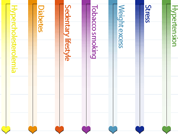It is important to identify chest pain, or angina pectoris, because it can signal a myocardial infarction, commonly known as a heart attack.
Symptoms
- oppression in the chest or upper abdomen, which may spread to the neck, arms, shoulders or jaw
- the pain may occur only during physical exercise or emotional moments, and disappear after several minutes of rest. This is referred to as stable angina.
- if the pain appears at rest or if it persists after 15 minutes of rest, it is unstable angina, with a risk of a heart attack.
BEWARE
Sometimes there are no symptoms, especially if you have diabetes
What actions must be taken?
- In the case of stable angina, you should quickly contact your general practitioner or primary care physician.
- In the case of unstable angina or a suspected heart attack, you should immediately dial the emergency number (144 in Switzerland) to be taken immediately by ambulance to the hospital.
EVERY MINUTE COUNTS!
